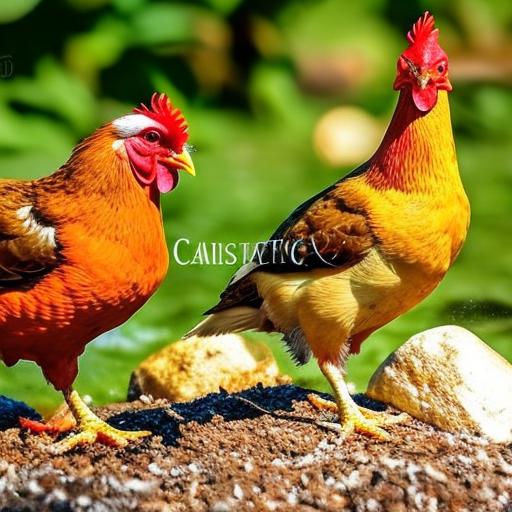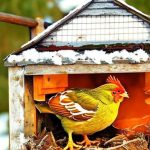Keeping your chickens cool in extreme heat is crucial for their health and well-being. Chickens are highly susceptible to heat stress, which can lead to serious health issues and even death if not properly managed. As temperatures rise, it’s important to take proactive measures to ensure that your chickens are comfortable and safe.
Heat stress occurs when chickens are unable to regulate their body temperature effectively. This can happen when the ambient temperature is too high, or when the humidity is too high, making it difficult for the chickens to cool down through evaporation. When chickens are exposed to prolonged periods of heat stress, they can experience a range of symptoms including panting, lethargy, decreased egg production, and even death.
Keeping your chickens cool in hot weather is not just about their comfort; it’s also about their overall health and productivity. When chickens are exposed to extreme heat, their bodies divert energy away from egg production and growth towards cooling themselves down. This can result in decreased egg production and slower growth rates. By providing a cool and comfortable environment for your chickens, you can help them maintain their productivity and overall health.
Key Takeaways
- Keeping chickens cool in extreme heat is important for their health and well-being.
- Providing adequate shade is the first step to keeping chickens comfortable in high temperatures.
- Hydration is key, and ensuring chickens have access to enough water is crucial in hot weather.
- A misting system can be a simple addition to keep chickens cool and happy.
- Proper ventilation in the chicken coop is important for maintaining airflow and reducing heat stress.
Providing Adequate Shade: The First Step to Keeping Your Chickens Comfortable in High Temperatures
One of the most important steps in keeping your chickens cool in hot weather is providing them with adequate shade. Shade helps to reduce the direct exposure to sunlight and can significantly lower the ambient temperature in the chicken coop or run.
When providing shade for your chickens, it’s important to consider both the size of the shade area and its location. The shade area should be large enough to accommodate all of your chickens comfortably, allowing them to move around freely without overcrowding. It should also be located in an area that receives adequate airflow, as stagnant air can contribute to heat buildup.
There are several ways to provide shade for your chickens. One option is to use natural shade sources such as trees or shrubs. Planting trees or installing shade cloth can provide a cool and comfortable area for your chickens to escape the heat. Another option is to use portable shade structures such as umbrellas or canopies. These can be easily moved around to provide shade wherever it’s needed most.
Hydration is Key: How to Ensure Your Chickens are Getting Enough Water in Hot Weather
Hydration is crucial for chickens in hot weather, as it helps them regulate their body temperature and stay cool. Chickens need access to clean, cool water at all times, especially during periods of extreme heat.
To ensure that your chickens are getting enough water, it’s important to provide them with multiple water sources throughout their coop or run. This will prevent overcrowding and ensure that all chickens have equal access to water. It’s also important to regularly check and clean the water containers to prevent the growth of bacteria or algae.
In addition to providing clean water, you can also help keep your chickens hydrated by adding electrolytes to their water. Electrolytes help replenish the minerals and nutrients that chickens lose through sweating and panting. You can find electrolyte supplements specifically designed for chickens at your local feed store.
The Benefits of a Misting System: Keeping Your Chickens Cool and Happy with a Simple Addition
| Benefits of a Misting System for Chickens | Metric |
|---|---|
| Reduced Heat Stress | Decreased panting and increased egg production |
| Improved Air Quality | Reduced ammonia levels and respiratory issues |
| Lowered Mortality Rates | Decreased risk of heat stroke and other heat-related illnesses |
| Increased Comfort | Less feather loss and improved overall well-being |
| Cost-Effective | Uses less water than traditional cooling methods |
A misting system can be a great addition to your chicken coop or run, as it provides a constant source of cool mist that helps lower the ambient temperature and keeps your chickens comfortable.
Misting systems work by spraying a fine mist of water into the air, which then evaporates and cools down the surrounding area. This can significantly reduce the temperature in the chicken coop or run, making it more comfortable for your chickens.
Installing a misting system is relatively simple and can be done using basic plumbing supplies. You will need a water source, such as a garden hose, and a misting nozzle that can be attached to the hose. The misting nozzle should be positioned in an area where it can provide maximum coverage to the chickens.
It’s important to note that while misting systems can be effective in cooling down the environment, they should not be used excessively. Over-misting can lead to excessive humidity, which can actually make the chickens more uncomfortable and increase the risk of heat stress.
Ventilation Matters: The Importance of Proper Airflow in Your Chicken Coop
Proper ventilation is crucial for chickens in hot weather, as it helps remove stale air and heat from the coop and allows fresh air to circulate. Good airflow helps to lower the ambient temperature and prevent heat buildup, reducing the risk of heat stress.
To ensure proper ventilation in your chicken coop, it’s important to have adequate openings for air to enter and exit. This can be achieved by installing windows or vents that can be opened and closed as needed. It’s also important to position the openings strategically to take advantage of natural airflow patterns.
In addition to providing adequate openings, you can also use fans to improve airflow in your chicken coop. Fans help circulate the air and create a cooling breeze, making the environment more comfortable for your chickens. It’s important to position the fans so that they are not blowing directly on the chickens, as this can cause drafts and make them more susceptible to respiratory issues.
Cool Treats for Hot Days: Creative Ways to Keep Your Chickens Entertained and Comfortable

Providing cool treats for your chickens on hot days not only helps keep them entertained but also helps them stay cool and comfortable. There are several creative ways you can provide cool treats for your chickens.
One option is to freeze fruits or vegetables and offer them as a refreshing treat. You can freeze berries, watermelon chunks, or even peas in ice cube trays and then give them to your chickens. Not only will they enjoy pecking at the frozen treats, but the cold temperature will also help cool them down.
Another option is to provide a shallow pool of water for your chickens to splash around in. Chickens enjoy wading in water, and it can help them cool down on hot days. You can use a shallow plastic tub or even a kiddie pool filled with a few inches of water. Just make sure to supervise your chickens while they are in the water to ensure their safety.
Adjusting Feeding Schedules: How to Ensure Your Chickens are Eating Enough, But Not Overheating
Adjusting feeding schedules is important in hot weather to ensure that your chickens are eating enough to maintain their health and productivity, but not overheating themselves in the process.
Chickens have a natural instinct to eat more during cooler parts of the day, such as early morning or late evening. By adjusting their feeding schedule to coincide with these cooler times, you can help prevent them from overheating while still ensuring that they are getting enough nutrition.
It’s also important to monitor your chickens’ food intake and adjust it accordingly. During periods of extreme heat, chickens may eat less due to decreased appetite. It’s important to offer smaller, more frequent meals to encourage them to eat enough without overwhelming them.
The Role of Dust Baths: Why Dust Baths are Essential for Your Chickens’ Comfort in Hot Weather
Dust baths are essential for chickens in hot weather as they help them regulate their body temperature and keep their feathers clean and healthy. Dust baths help remove excess oil and dirt from the feathers, which can help prevent overheating and reduce the risk of parasites.
To provide a dust bath for your chickens, you will need a shallow container filled with fine dust or sand. You can also add diatomaceous earth or wood ash to the dust bath, as these substances can help control parasites and keep the chickens’ feathers clean.
It’s important to place the dust bath in a shaded area to prevent the dust from becoming too hot. You should also make sure that the dust bath is large enough for all of your chickens to use at the same time, as they will likely want to take turns.
Monitoring Your Flock: Signs of Heat Stress and What to Do About Them
Monitoring your flock for signs of heat stress is crucial in hot weather, as it allows you to take immediate action if any of your chickens are showing symptoms. Some common signs of heat stress in chickens include panting, lethargy, decreased egg production, and pale combs and wattles.
If you suspect that any of your chickens are experiencing heat stress, it’s important to take immediate action to cool them down. Move them to a shaded area with good airflow and provide them with cool water to drink. You can also use a misting system or a fan to help lower their body temperature.
It’s also important to monitor your flock’s behavior and make adjustments as needed. If you notice that your chickens are spending more time in the shade or are not eating as much as usual, it may be a sign that they are feeling the effects of the heat. Adjust their feeding schedule and provide additional shade and water if necessary.
Staying Ahead of the Heat: Tips for Keeping Your Chickens Cool and Healthy All Summer Long
Keeping your chickens cool and healthy in hot weather requires proactive measures and careful monitoring. By providing adequate shade, ensuring proper hydration, installing a misting system, promoting good ventilation, offering cool treats, adjusting feeding schedules, providing dust baths, and monitoring your flock for signs of heat stress, you can help keep your chickens comfortable and safe all summer long.
Remember that prevention is key when it comes to heat stress in chickens. By taking proactive measures to keep your chickens cool and comfortable, you can help prevent heat stress and ensure that your flock stays healthy and productive. So, stay ahead of the heat and take action to keep your chickens cool and healthy in hot weather.
If you’re a chicken owner, you know how important it is to keep your feathered friends comfortable, especially during extreme weather conditions. In the scorching heat of 110 degrees, it’s crucial to take extra measures to ensure their well-being. Check out this informative article on how to keep chickens cool in hot temperatures. From providing shade and proper ventilation to using misters and frozen treats, these tips will help you keep your chickens happy and healthy even in the hottest of days. Learn more here.
FAQs
What is the ideal temperature range for chickens?
Chickens are comfortable in temperatures ranging from 50-80 degrees Fahrenheit. Anything above 80 degrees can cause stress and discomfort.
What are the signs of heat stress in chickens?
Signs of heat stress in chickens include panting, lethargy, loss of appetite, decreased egg production, and even death.
How can I keep my chickens cool in 110-degree weather?
To keep chickens cool in extreme heat, provide shade, plenty of fresh water, and good ventilation. You can also use misters or fans to help lower the temperature.
What kind of shade is best for chickens?
Natural shade from trees or bushes is ideal, but if that’s not available, you can use tarps or umbrellas to create shade. Make sure the shade covers the entire coop and run area.
How often should I change my chickens’ water in hot weather?
In hot weather, you should change your chickens’ water at least twice a day to ensure it stays cool and fresh. You can also add ice cubes to the water to help keep it cool.
Can I give my chickens frozen treats to help keep them cool?
Yes, frozen treats like watermelon, berries, or even frozen peas can help keep chickens cool and hydrated in hot weather. Just make sure to remove any uneaten treats to prevent attracting pests.
Meet Walter, the feathered-friend fanatic of Florida! Nestled in the sunshine state, Walter struts through life with his feathered companions, clucking his way to happiness. With a coop that’s fancier than a five-star hotel, he’s the Don Juan of the chicken world. When he’s not teaching his hens to do the cha-cha, you’ll find him in a heated debate with his prized rooster, Sir Clucks-a-Lot. Walter’s poultry passion is no yolk; he’s the sunny-side-up guy you never knew you needed in your flock of friends!







